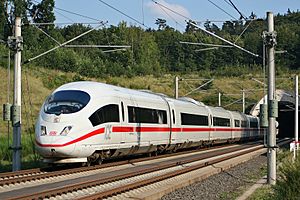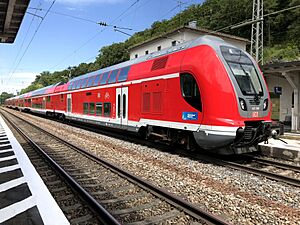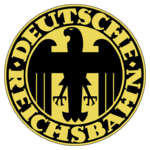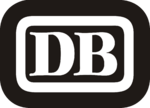Deutsche Bahn facts for kids
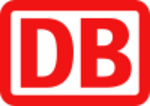
Logo since 1994
|
|
| State-owned enterprise | |
| Industry | Rail transport, Logistics, Bus |
| Predecessors | Deutsche Reichsbahn (1920–1949) Deutsche Bundesbahn (1949–1994) Deutsche Reichsbahn (1949–1994) |
| Founded | 1 January 1994 |
| Headquarters | Bahntower,
,
Germany
|
|
Area served
|
Europe |
|
Key people
|
Richard Lutz (CEO) |
| Products | Rail transport, cargo transport, services |
| Revenue | |
| Owner | Government of Germany |
|
Number of employees
|
Worldwide 338.000 Germany 211.000 |
Deutsche Bahn AG (often called DB) is Germany's national railway company. It is owned by the German government. Its main office is in the Bahntower building in Berlin.
DB was created in 1994. This happened when the railway companies of West and East Germany joined together after Germany became one country again. Deutsche Bahn is one of the biggest transport companies in Germany. It helps people travel long distances and short distances by train. In 2022, it carried about 132 million long-distance passengers and 1.6 billion regional passengers. It also moved 222 million tons of cargo.
Contents
How Deutsche Bahn Works
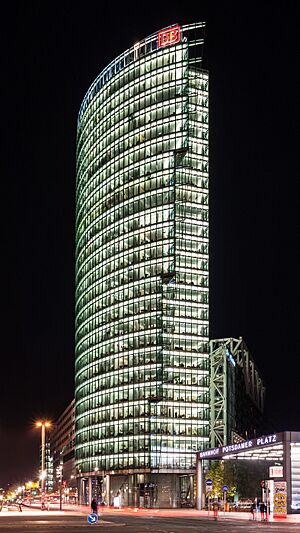
Deutsche Bahn is made up of several different companies. These include:
- DB Fernverkehr: This part handles long-distance passenger trains.
- DB Regio: This part manages local passenger train services.
- DB Cargo: This part deals with moving goods by train.
Another important part is DB InfraGO. This company manages most of Germany's railway tracks and stations. It is the largest rail network in Europe. About half of DB's money comes from running trains. The other half comes from other transport and logistics services.
Passenger Train Services
DB Personenverkehr is the part of Deutsche Bahn that manages passenger travel. This group is split into two main sections: DB Fernverkehr and DB Regio.
Long-Distance Trains: DB Fernverkehr
DB Fernverkehr AG runs long-distance passenger trains in Germany. It started in 1999 and was renamed in 2003.
This part of DB operates all Intercity Express (ICE) and Intercity (IC) trains in Germany. Some of these trains also travel to nearby countries like the Netherlands, France, Switzerland, and Austria. DB Fernverkehr is the main company for long-distance train travel in Germany.
Local Trains: DB Regio
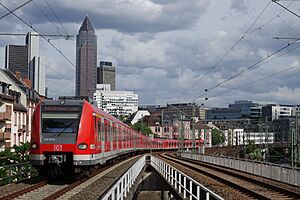
DB Regio AG runs passenger trains for short and medium distances in Germany. These services are ordered and paid for by the different German states (called Bundesländer).
DB Regio has several regional companies. These include:
- DB Regio Nord for northern Germany.
- DB Regio Nordost for Berlin and surrounding areas.
- DB Regio NRW for North Rhine-Westphalia.
- DB Regio Südost for Saxony, Saxony-Anhalt, and Thuringia.
- DB Regio Mitte for Rhineland-Palatinate, Saarland, and Hesse.
- DB Regio Baden-Württemberg for parts of Baden-Württemberg.
- DB Regio Bayern for Bavaria.
- S-Bahn Hamburg and S-Bahn Berlin for city train networks.
- RegioNetz for smaller, independent networks.
DB Regio also operates many bus services through its 25 bus companies.
Moving Goods: Logistics
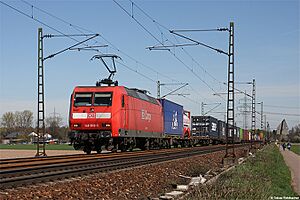
The logistics part of DB includes DB Schenker and DB Cargo. DB Cargo focuses on moving goods by rail. DB also works with a company called time:matters to transport smaller packages on its high-speed trains.
Railway Infrastructure
DB InfraGO
The infrastructure part of DB used to be split into three areas: tracks (DB Netz), stations (DB Station&Service), and energy (DB Energie). In December 2023, DB Netz and DB Station&Service joined together to form DB InfraGO AG. This new company aims to improve how the railway network is managed. The "GO" in InfraGO stands for "Gemeinwohlorientierte," which means "focused on the common good."
DB Engineering & Consulting
DB Engineering & Consulting helps with building, planning, and maintaining railways. This company also works on projects outside Germany. For example, it helped the California High-Speed Rail Authority in the USA with planning their high-speed rail program.
International Business
Arriva
Deutsche Bahn bought a company called Arriva in 2010. Arriva operates buses and trains in many European countries, especially in the United Kingdom and Ireland. In October 2023, Deutsche Bahn agreed to sell Arriva to another company, I Squared Capital. This sale was completed in June 2024.
DB Cargo UK
DB also owns DB Cargo UK, which is the largest rail freight operator in the United Kingdom. This company even operates the British Royal Train. DB also has business in Eastern Europe. You can find train times for journeys across Europe on Deutsche Bahn's website.
Trans-Eurasia Logistics
Trans-Eurasia Logistics is a company that DB runs with Russian Railways. It operates freight trains that carry containers between Germany and China, traveling through Russia.
History of Deutsche Bahn
Early German Railways
The first railway tracks in Germany were laid in 1835. They connected Nuremberg and Fürth. The Deutsche Reichsbahn was the national railway company from 1920 until 1949. After World War II, Germany was divided. So, the railway split into two companies: Deutsche Reichsbahn in East Germany and Deutsche Bundesbahn in West Germany.
When Germany became one country again in 1990, these two companies merged. On January 1, 1994, they formed the new company, Deutsche Bahn. At this time, DB also got its current logo and the "DB" abbreviation. The company was set up to be a single, private company running railways across all of Germany.
DB's main office was first in Frankfurt am Main. In 1996, it moved to the Bahntower in Berlin.
Changes Since 1999
In 1999, Deutsche Bahn made more changes. It divided its different services into separate companies. This helped other train companies use the railway lines too.
In December 2007, DB changed its structure again. All passenger services became part of DB Bahn. Logistics became part of DB Schenker. And infrastructure (tracks and stations) became part of DB Netze.
The German government still owns Deutsche Bahn. The government must keep control of the railway infrastructure.
In 2008, there were plans to sell a part of DB to private investors. But this plan was stopped because of a big financial crisis.
In June 2018, there were problems with train services in the United Kingdom operated by DB's company, Arriva. Many trains were cancelled or delayed.
In 2024, Deutsche Bahn faced challenges during the Euro 2024 football tournament. There were train delays and cancellations. The company also announced plans to reduce some administrative jobs. In September 2024, DB agreed to sell its logistics company, Schenker, to DSV of Denmark.
DB Logos Over Time
Types of Trains
Trains in Germany are grouped by how often they stop, how fast they go, and how comfortable they are.
Long-Distance Train Types
- ICE (Intercity-Express): These are high-speed trains that connect major cities. Some ICE routes also go to other European countries.
- EC (EuroCity): These are intercity trains that cross borders, connecting Germany with other countries.
- IC (InterCity): These are long-distance trains that connect regions and cities. They are a bit slower than ICE trains and make more stops.
Other train companies also operate international high-speed trains into Germany:
- ECE from Switzerland.
- TGV from France.
- Railjet from Austria and the Czech Republic.
Regional Train Types
- IRE (Interregio-Express): These are longer-distance regional trains that connect regions and cities.
- RE (Regional-Express): These trains serve regions and connect cities. They do not stop at every station.
- RB (Regionalbahn): These trains stop at all stations on their route. They are often the most basic train service.
- S (S-Bahn): This is a type of city train system for larger cities. S-Bahn trains stop at all stations and run very often.
Other train companies in Germany might use different names for their regional trains.
Old Train Types
Some train categories are no longer used:
- D (D-Zug or Schnellzug): This was the express train category, replaced by IC and ICE.
- E (Eilzug): A semi-fast service, faster than local trains but not as fast as D trains.
- IR (InterRegio): Meant to connect cities and regions at a lower price. Replaced by IC, RE, and IRE.
- MET (Metropolitan): A luxury train service. These trains are now used for regular IC and ICE services.
- N (Nahverkehrszug): The most basic local train service, replaced by RB.
- SE (Stadt-Express): A mix of RE and RB, skipping stops in cities but stopping everywhere else. Replaced by RE and RB.
Train Tickets
DB offers different ways to buy tickets for long-distance trains:
- The Flexpreis: This ticket gives you full flexibility. You can use any train on your chosen route on the day you picked. The price does not change based on when you buy it.
- The Sparpreis and Super-Sparpreis: These tickets are usually cheaper. You must buy them in advance, and they are only valid for a specific train connection.
Ticket prices generally get cheaper per kilometer the further you travel. Seat reservations are usually only included with first-class tickets.
For local trains (S, RB, RE, IRE), you can also use tickets from local transport groups. These tickets can often be used on buses, trams, and U-Bahn trains too.
DB also has discount cards called BahnCard.
- BahnCard 25: Gives you 25% off most tickets.
- BahnCard 50: Gives you 50% off flexible tickets and 25% off cheaper advance tickets.
- BahnCard 100: Lets you travel unlimited on all Deutsche Bahn trains and many local transport systems.
Other special tickets include Länder-Tickets ("state tickets"). These allow unlimited travel on local trains within a specific German state. They also offer group tickets for up to five people.
Sponsorships
Deutsche Bahn sponsored the German football club Hertha BSC from 2006 to 2015.
Train Incidents
- 2025 Riedlingen disaster
- 2025 Hamburg train accident
- Bad Aibling rail accident
- Brühl train derailment
- Eschede train disaster
- Garmisch-Partenkirchen train derailment
- Hordorf train collision
- 2012 Stuttgart derailments
See also
 In Spanish: Deutsche Bahn para niños
In Spanish: Deutsche Bahn para niños
- DB Fernverkehr
- DB Regio
- DB Cargo
- Rail transport in Germany
- Transport in Germany
 | Shirley Ann Jackson |
 | Garett Morgan |
 | J. Ernest Wilkins Jr. |
 | Elijah McCoy |


